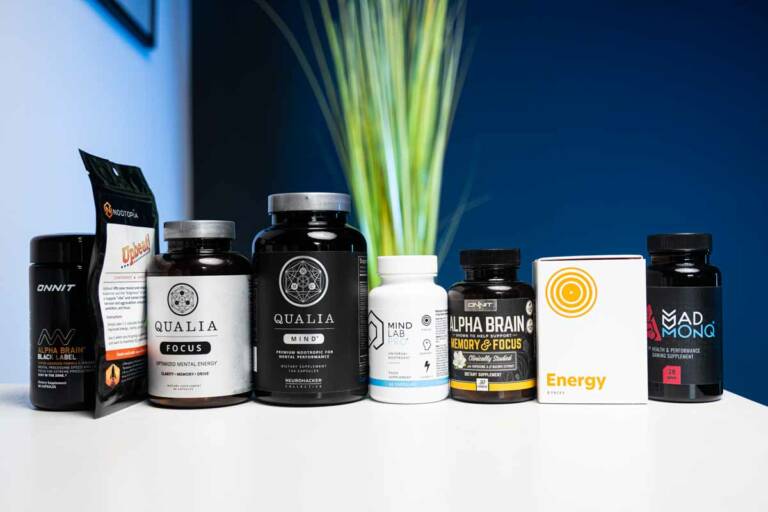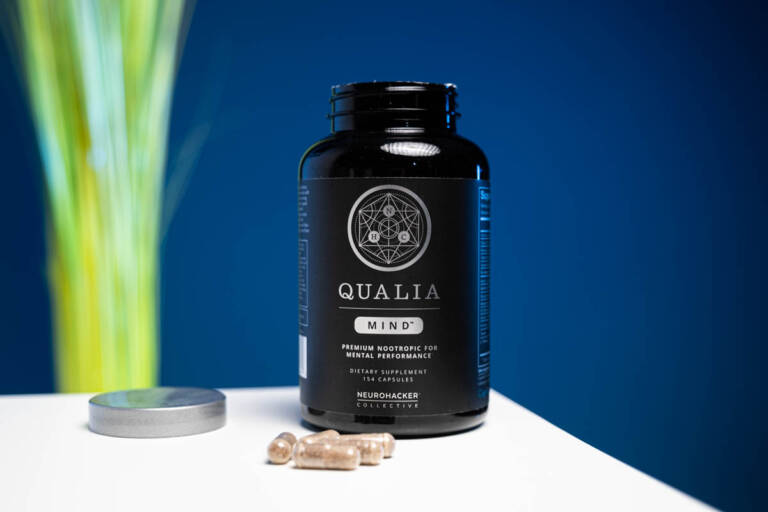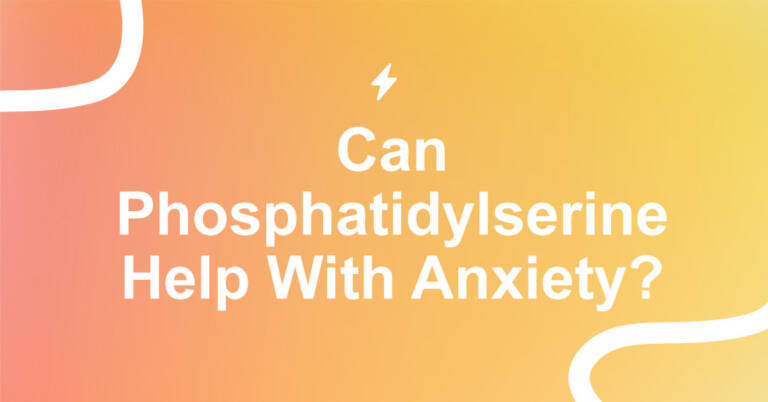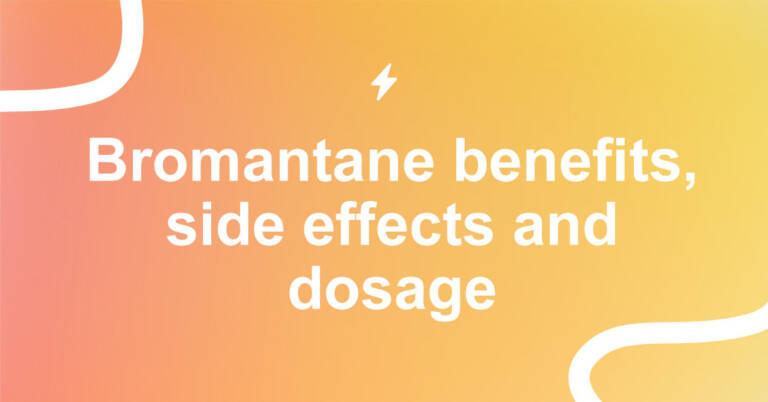Sulbutiamine is a synthetic derivative of vitamin B1, which is also known as thiamine. Thiamine has a key part to play in various aspects of overall health and can easily be found in some foods.
However, thiamine gets absorbed poorly by the body and cannot pass through the blood-brain barrier. As such, a thiamine deficiency, without the help of a balanced diet or thiamine supplementation, may trigger severe health risks.
Being a thiamine derivative, sulbutiamine, also known as isobutyryl thiamine disulfide, fuses two vitamin B molecules with a disulfide or double sulfur group. This creates a fat-soluble derivative that presents better and greater bioavailability and comes with other distinct properties.
For instance, the two molecules, which become chemically bonded, can easily cross the blood-brain barrier and allow the body to utilize each dose of sulbutiamine much more efficiently than standard thiamine.
Since the body does not create sulbutiamine on its own, its benefits can best be availed by using it as a supplement.
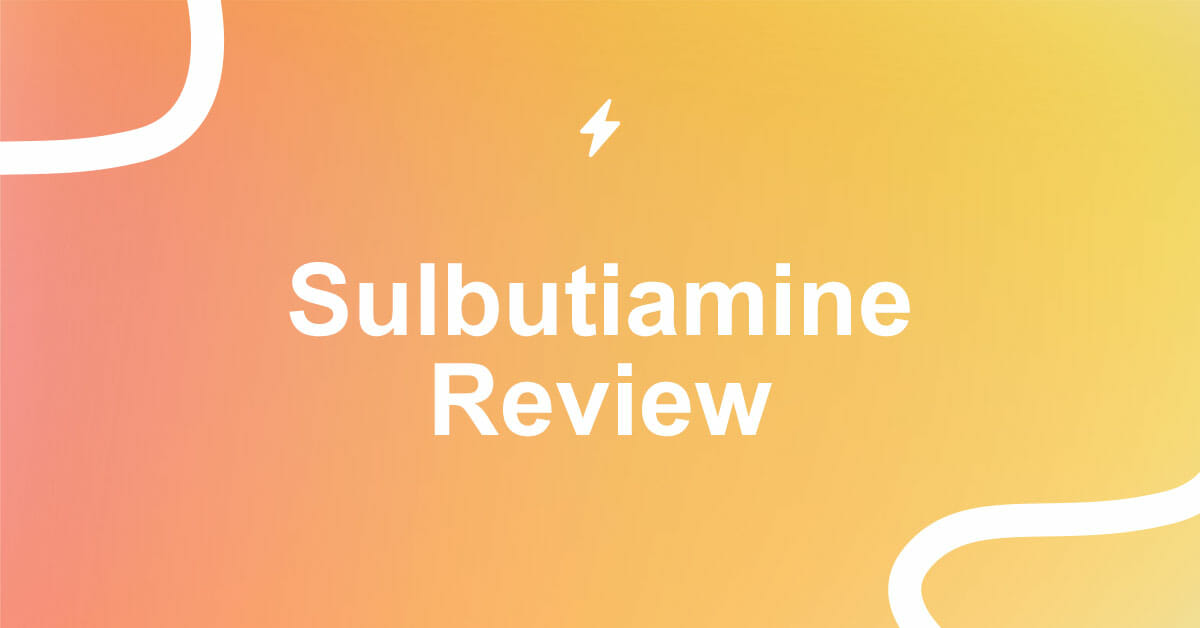
Sulbutiamine Benefits
Sulbutiamine owes its synthetic development to Japanese researchers in an effort to treat thiamine deficiencies, asthenia, and fatigue. It claims to improve energy levels and promote various aspects of mood and motivation that can add to the well-being of an individual.
In addition, sulbutiamine also helps improve brain function by supplying it with enough thiamine to improve memory, cognition, and mental clarity.
Given its ability to cross the blood-brain barrier more readily, it performs a number of important functions in the brain.
Even though there is insufficient evidence to back all its purported benefits, here is what research says in support of sulbutiamine supplementation.
It Can Treat Chronic Fatigue
The primary reason that many people opt for using sulbutiamine is to treat chronic fatigue issues. Known as asthenia, this type of fatigue is not restricted to extreme physical weakness alone but can expand to include mental fatigue as well.
This use of sulbutiamine is so popular that it is prescribed in some countries for treating chronic fatigue.
In fact, sulbutiamine is said to have a noticeable energizing effect that many people may compare to caffeine. Although not a traditional stimulant, many users still find that it can increase mental arousal in a somewhat similar manner.
Some research has studied the use of sulbutiamine for treating asthenia or pathological fatigue, which is caused by infectious disease or cerebral damage.
One such study showed that patients with the condition saw a complete reversal in symptoms after two weeks of use when sulbutiamine was used alongside specific anti-infective treatment.
The greatest response was observed in those with acute infection and symptoms related to cerebral function. [*]
In another study, individuals afflicted with chronic fatigue were given between 400 to 600 mg of sulbutiamine versus placebo daily.
After being tested on the 7th and 28th days of the study, individuals who used 600 mg of sulbutiamine appeared less fatigued than the placebo group or those who received 400 mg. [*]
Other studies have confirmed that sulbutiamine may also be effective in treating the general fatigue that comes from multiple sclerosis. Here, as it combats fatigue, sulbutiamine seems to increase energy significantly in patients suffering from this disease and is fairly well tolerated. [*]
Can Enhance Energy Levels
Research shows that highly motivated people have higher dopamine levels, whereas low dopamine levels are generally associated with lower energy levels and less motivation.
Animal research indicates that there is an increase of D1 dopaminergic binding sites in the prefrontal cortex that modulate the brain’s usage of dopamine in this region. One study concludes that both dopaminergic and glutamatergic cortical transmission may be modulated by acute sulbutiamine administration. [*]
On the energy front, thiamine helps the conversion of carbohydrates, protein, and fats into glucose for energy production. These vitamins are crucial for the eyes, liver, nails, and hair, and also support the nervous system and brain function.
However, since B1 levels in foods are highly susceptible to heat, cooking times, and storage length, sulbutiamine in supplemental form makes for a better source of energy.
Like thiamine, sulbutiamine also works to generate energy in the body.
It can be particularly helpful for athletes who need sustained energy for athletic performance. Its use is a common occurrence in athletic events where doping authorities have often detected it while screening for anabolic steroids. [*]
Another form of thiamine known as thiamine triphosphate is also important for glucose metabolism and cellular energy metabolism and helps keep energy levels up.
It May Help With Stress Management
Vitamin B1 is also sometimes referred to as the anti-stress vitamin that can fortify the body to better withstand stress. Like other B vitamins, B1 also helps maintain a healthy nervous system which is beneficial for stress management as a strong nervous system can fight the effects of stress more effectively.
Research with B1 suggests that the effects of sulbutiamine may improve mood and even help protect against anxiety or depression.
When one group of sixty participants suffering from workplace stress were given two forms of high dose vitamin B complex for three months, findings showed the vitamin B complex treatment groups to report lower personal strain, reduced confusion, and minimization in depressed/dejected mood. [*]
In one UK-based study involving 120 young adult females were given either a placebo or 50 mg of thiamine for two months. Study findings showed that reaction times improved in the areas of mood, feeling more clearheaded, better composure, and improved energy and reaction times. [*]
Overall, despite limited research, sulbutiamine has a valid reputation as an effective mood-elevating nootropic despite a quick tolerance buildup.
Can Help Manage Depression
Taking it a step further, sulbutiamine is considered especially helpful for people suffering from depression. This may likely be because of its ability to boost dopamine, serotonin, GABA, and glutamate activity in the brain.
One study investigated the effects of sulbutiamine on behavioral inhibition, which occurs during major depression. This term refers to the general lack of motivation and engagement that afflicts people with depression.
Even after being treated for depression and once the condition lifts, some people may still have trouble resuming day-to-day activities.
The study in question here showed that sulbutiamine may help motivate and re-engage people suffering from depression, although the researchers did not find any evidence of it actually treating the depression. [*]
Can Assist Memory Enhancement
Memory issues appear to be related to low choline levels in the brain. Choline is necessary for the creation of ACh or acetylcholine, and since this plays an important role in memory formation, some researchers hypothesize that people with more acetylcholine have greater memory function.
Sulbutiamine improves memory and may produce a noticeable increase in mental clarity making users feel more alert and awake. Some may consider this an effect similar to that they would get from caffeine, but without the jitters involved.
One study investigating the effects of choline activity in the brain administered sulbutiamine for 10 days to a group of mice. Study findings revealed that long-term memory formation in mice improved after chronic administration of sulbutiamine through possible cholinergic mediation and increasing choline activity in the brain. [*]
Because sulbutiamine can modulate the flow of cholinergic, glutamatergic and dopaminergic neurological transmissions, it may increase the speed and ease of transmission between these receptors, allowing for better memory formation and quicker recall.
Yet another animal study administered chronic treatment with sulbutiamine suggesting that it may counteract the amnesic effects of Dizocipline by improving working and episodic memory. [*]
Exhibits Neuroprotective Properties
Along with generating energy reserves for the brain and body, sulbutiamine also has neuroprotective properties.
For instance, it may extend the lifespan of nutrient-deprived brain cells treated with sulbutiamine than others that didn’t receive sulbutiamine support.
Or it was observed to enhance and support the lifespan of brain cells that were oxygen and sugar deficient.
At the same time, sulbutiamine garnered additional antioxidant support by boosting the activity of antioxidant enzymes and lowering levels of harmful chemicals in brain cells. [*]
The thiol content in sulbutiamine acts in an antioxidant capacity, reducing free radical activity that would otherwise cause cell damage. When the body breaks down sulbutiamine, thiols become available for use by cells.
In one in vitro model of ischemia, sulbutiamine was suggested to increase hippocampal neuron viability and cell-to-cell communication during excitatory synaptic transmission in a concentration-dependent manner.
The evidence that sulbutiamine offers neuroprotection against oxygen and glucose deprived neurons in the hippocampus suggests that it can be a potential therapeutic agent against brain ischemia. [*]
Potential Treatment For Alzheimer’s Disease
Sulbutiamine may also mitigate Alzheimer’s disease symptoms. Some research indicates that mice with Alzheimer’s disease receiving the thiamine derivative benfotiamine diminished plaques, reduced phosphorylation of tau, and reversed memory deficits. [*]
Another study used an acetylcholinesterase inhibitor with sulbutiamine in early-stage and moderate Alzheimer disease with some improvements in attention and episodic memory. [*]
Although human studies are still lacking, sulbutiamine seems to help maintain proper thiamine levels and keep the memory functioning optimally.
May Be Beneficial For ADHD
Dopamine abnormalities are often a consideration in ADHD, and so many ADHD individuals tend to respond well to nootropic stimulant therapy.
As sulbutiamine boosts thiamine and regulates dopamine, it may potentially have brain-boosting effects for those with ADHD. And because users can hope to improve mental and physical performance, the results may be similar to other mildly stimulating nootropics.
May Treat Erectile Dysfunction
Sulbutiamine may also be able to help treat a form of erectile dysfunction known as psychogenic erectile dysfunction (psychogenic ED).
One small study recruited 20 males suffering from psychogenic ED who were given a prescription of sulbutiamine using the drug Enerion for 30 days. The condition refers to failed erection for mental reasons rather than physical.
Findings showed 16 of the participants showing significant improvement indicating sulbutiamine as a possibly effective treatment for erectile dysfunction. [*]
This benefit may also tie into the fact that sulbutiamine can improve mood and focus which may improve erectile function. Yet, more research is needed in this area to establish its clinical efficacy but it certainly qualifies as a promising initial finding.
Thiamine Deficiency
Even though rare, a thiamine deficiency can lead to some serious side effects and health risks. Certain diseases like Wernicke Korsakoff syndrome, beriberi, and Aids all have a connection to thiamine deficiency and anyone with these conditions is also more vulnerable to having a vitamin B1 deficiency.
Certain other demographics can also be at a higher risk of a deficiency including alcoholics, diabetics, the elderly, people on dialysis, and those having undergone gastric bypass surgery.
A thiamine deficiency may also cause excessive weight loss, confusion, memory loss, muscle weakness, or cardiovascular issues in some cases.
Lacking sufficient thiamine, may also slow ATP production in the body and reduce acetylcholine levels. This can have a negative impact on short-term memory, perception, and even the ability to comprehend.
Sulbutiamine Dosage
Sulbutiamine is readily available as capsules, tablets, or powder. The recommended dose for sulbutiamine can range from 400 to 1000 mg per day. People who take higher doses can split their dose into two, taking the first in the morning and the latter in the afternoon.
However, since there are some mild stimulant effects of sulbutiamine, it isn’t recommended to take it later in the day as it may interfere with sleep patterns.
Since sulbutiamine is a fat-soluble compound, the best suggestion is to take it alongside food to maximize its absorption. Experts recommend taking it with a healthy fat source such as peanut butter, olive oil, or coconut oil to optimize absorption.
As sulbutiamine tolerance may be an issue for some people, those taking a daily supplement should consider cycling to minimize such issues. A good cycle to follow is five days on and two days off when using sulbutiamine supplements.
For people just starting out with sulbutiamine, a good recommendation is to start with a lower dose and see how the body reacts.
Sulbutiamine provides an almost immediate effect and seems to kick in soon after consumption. Sulbutiamine gets absorbed rapidly and peak blood concentration is easily reached between one and two hours after administration. This makes sulbutiamine’s half-life approximately around five hours.
This rapid uptake of sulbutiamine by the brain is probably linked to its nootropic effect.
Sulbutiamine Side Effects
Being a synthetically derived form of thiamine, sulbutiamine is a nontoxic variant and is considered safe and generally well-tolerated.
The side effects of sulbutiamine are rare and may only happen when an exceptionally high dose of sulbutiamine is taken. Typical side effects may include issues like headaches, rashes on the skin, difficulty sleeping, and mood swings.
Of these, difficulty sleeping may be the most common consideration and can be resolved by taking the daily dose at an earlier time during the day. If you feel irritable, agitated, or overstimulated when taking sulbutiamine you can lower the dose as well.
Rashes on the skin, especially severe ones, are typically associated with taking a higher dose of sulbutiamine. Once again, reducing the dose can help alleviate this issue unless you have an allergic reaction.
Certain people, particularly those dealing with bipolar disorder, may experience more mood swings than usual when taking sulbutiamine. As such, anyone diagnosed with bipolar disorder should not take sulbutiamine supplements without consulting with their doctor first.
Also, some individuals may find sulbutiamine to be addictive. So, if there are any addiction-like tendencies, the best thing is to be cautious about using sulbutiamine as a supplement.
Stacking Sulbutiamine
Biohackers often try to optimize the positive effect of nootropics by stacking them. As such, it is common to find sulbutiamine as a component of different stacks that can help you reach more benefits than taking them individually.
One popular nootropic stack that can provide plenty of additional choline and slow down the decomposition of choline includes sulbutiamine, alpha GPC, and huperzine A.
This stack purports to enhance memory while also improving concentration. You can take the stack in a single dose or two times daily with about 200 mg of sulbutiamine, 300 mg of alpha GPC, and 200 mcg of huperzine A.
Users also stack different racetams with sulbutiamine to get a boost of energy and improved mood. The stack also boasts to help with concentration, cognition, and comprehension.
A typical stack will usually contain 200 mg of sulbutiamine, 300 mg of alpha GPC, and 750 mg of any racetam that you prefer.
Verdict
A brain and mood-boosting nootropic, that also supports energy levels and cognition with a neuroprotective effect, sulbutiamine is a potent all-rounder. Being the more powerful version of thiamine, it maintains thiamine levels and does the job in a shorter time.
Users like the way it resolves their fatigue-related issues and others consider it a good and effective nootropic for a quick temporary boost of memory and cognition.
Given its non-risky safety profile, it can be a suitable suggestion for people new to nootropics as well as for other advanced biohackers who like to create their own customized stacks.
